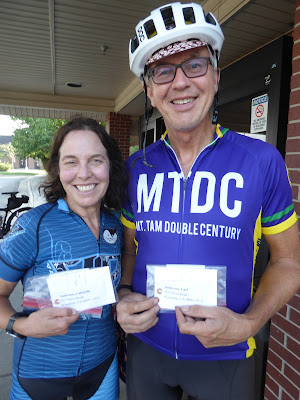It's December, and the snow is only flying in the mountains, but it's cold enough here to be inside planning, so it's time to take a look at next year's Grand Randonnées!
Six US Grand Randonnées are scheduled for 2023:
Some Early Season Events! - The Texas and Florida 1200k's in March are the earliest in the year in US history. And only two had been scheduled in April - two prior editions of Carolina Spring.
Route Shapes ... and Logistics - Four of the events are four-loop events, which have become more and more popular. Three of these are genuinely "cloverleaf" - loop emanating to the four points of the compass from the ride finish. Ours (the Colorado Front Range 1200) is less so, because we are bounded by the Denver Metro Area, so we only go in certain directions. But the advantages for riders and organizers are the same: easier logistics, and easier to support.
At the other end of the spectrum is point-to-point (such as the Craters 1200), where riders need to think about getting back to the start, or home.
Paris-Brest-Paris - That Other Event - Each of our US 1200k's prior to PBP can be ridden with lots of space between them and PBP. Either as prep, or just more 1200k fun! Some of you may choose one or more of these (or the Craters 1200, or a foreign Grand Randonnée other than PBP) instead of PBP. Plenty of options!
♦ ♦ ♦
Here are "award motivations" for riding a Grand Randonnée:
Finish two US grand randonnées in the same year.
Finish four different US grand randonnées - over any number of years
Finish a US grand randonnée, a populaire, a team event, 200k, 300k, 400k, 600k, and 1000k, and enough extra to add up to 5000 km in 24 months. (Extra time allowance for series spanning Covid timeframe.)
Finish PBP, another grand randonnée, two Super-Randonneur series (with 1000k's), an additional ACP 600k brevet with at least 8,000 m (26246 ft.) of climbing, a Fl
èche, and other ACP/RM events within six years.
(Extra time allowance for series spanning Covid timeframe.)RM Challenge LepertelA 1200 km or longer event in each of 4 consecutive calendar years, one of which must be PBP.
Les Randonneurs Mondiaux has relaxed the requirement to complete a grand randonnée in each of four successive years. You can make up the year 2020 and 2021 by riding an extra grand randonnée in a successive year.
And now details on the US grand randonnées ...
The
Golden Falcon is a new event organized by the Northeast Florida Randonneurs. This is a new region, led by Hamid Akbarian, who is also RBA of the Northern Virginia region, and who has organized two 1200k's there. We should expect easy logistics for riders, since the route is a cloverleaf (based out of Jacksonville), and limited support during the event, mainly at the overnight venue. (The event is designed to be self-supporting.) Could be a benign way to ride an early-season 1200k. About the name: the event page says, "The Golden Falcon symbol was used during the first dynasty of Persian Empire to recognize the freedom of all the people under the Persian Empire, especially women & minorities."
♦ ♦ ♦
The
Quick and Dirty is a new event organized by the Hill Country Randonneurs. It will be a cloverleaf-route tour of the Texas Hill Country - one of the most attractive areas in Texas - based out of Austin. This is an attractive, hilly and wooded area with many quiet roads. Folks who've ridden the Texas Rando Stampede have sampled this area. Pay attention to the lodging setup and recommendations such as the "Host hotel deadline." This should be a good, scenic event with opportunities for camaraderie.
♦ ♦ ♦
Carolina Spring continues the series of spring 1200k's organized by Tony Goodnight that have been well received, with a variety of routes over the years. Tony says, "There will be 3 sections into the Foothills of NC or VA, then to Sandhills of NC." All of these areas are attractive for cycling with nice terrain (some climbing in the foothills, and rolling terrain in the Sandhills). You are responsible for lodging, including en route, under the philosophy that one set of stages does not fit all riders. When I rode the Taste of Carolina, I made my own reservations a few hours beyond the third day's supported checkpoint because it made more sense for me. Worked out great.
♦ ♦ ♦
The
Northern Virginia Cloverleaf 1200K - based out of Sterling, VA - is the second edition of this challenging but logistically friendly ride. Limited support as is typical of the cloverleaf format, but expect excellent organization and a warm welcome from Hamid and Shab Akbarian. Christine Newman wrote a ride report of the first edition for the RUSA magazine,
American Randonneur.
♦ ♦ ♦
The
Colorado Front Range 1200 is a new event organized by Rocky Mountain Cycling Club. It is based out of Louisville, CO in Boulder County. Unlike the Colorado Last Chance 1200 and the Colorado High Country 1200, it uses the four-loop format like the cloverleaf 1200k's, but with the loops skewed to avoid population centers. It's a mix of canyons, Front Range mountains, and plains riding. It is based on the Solstice 1000k brevets (tacking on a 200k perm route), which can be ridden self-supported. Expect light event support but a scenic and challenging, and very doable event!
♦ ♦ ♦
Seattle International Randonneurs'
Craters 1200 is the second edition of this evocative event, although 1000k versions had been held earlier. With segments along the Pacific Coast, culminating at Crater Lake in Oregon, it is definitely alluring. Expect good organization, from one of the largest rando clubs in the nation. It is the only point-to-point US 1200k this year, so pay attention to the logistics issues of getting back home from the finish.
♦ ♦ ♦
Foreign Randonneurs Mondiaux Grand Randonnées
Have a look at the
Les Randonneurs Mondiaux calendar for 2023 for listings of Grand Randonnées worldwide. There are 68 events for 2023, despite it's being a PBP year. Some of these could be really evocative events and something new for you!
- 22 in India
- 11 in Australia
- 6 in the US (as mentioned above)
- 1 or 2 in other countries
♦ ♦ ♦
The 20th edition of Paris Brest Paris kicks off on August 20, 2023. This grandest of Grand Randonnées requires a fair amount of thought, preparation and planning, everything from which start group and starting wave to where to sleep during the ride to where to stay before and after the event. In addition to the ACP's PBP website, See the
RUSA PBP main page and
PBP FAQ page for more info.
♦ ♦ ♦
Choosing and Riding a Grand Randonnée
My traditional advice ...
While all grand randonnées aim to provide you a memorable experience, there are many styles of events, kinds of challenges, services, and what you get for your fee. So investigate and find which ones suit your personal goals!
Scenic and Challenging or Social ... or Both? - Each of these events is challenging, of course, and any can be social with the right attitude and discipline. But it can be easier to stick together as a group if the route is more moderated in its climbs, exposure, etc. Riding with a group may be important to you. Or you may be longing for that special, bracing experience, and willing to ride stretches alone or with a few friends who've agreed to stick together.
Your Ride Plan? - Some events provide a pretty definitive idea of where you should sleep. Others provide some accommodations at a number of controls. Still others leave you totally to your own devices.
» Stage-Oriented events have suggested riding segments per day, with overnight facilities provided at the ends of those segments. They have become more popular over the years. This scheme promotes rider cohesiveness, and allows riders to regroup on successive morning starts. They also allow the organizers to concentrate their lodging and food support at fewer points, making for upgraded lodging options and cost savings.
» "Freestyle" events come in variations on two themes: many staffed controls with sleep options (some of which may be limited, but still a place to sleep), such as Paris-Brest-Paris and the Rocky Mountain 1200; or no event-provided lodging, leaving you to research ahead of time, and make your own arrangements based on your ride plan, likely with a more economical entry fee.
It can be satisfying to tune your ride to how things are going, or to your own personal way of riding. It can also be comforting not to have to think about that, and just ride well-thought-out stages.
Pre-visualize how you'd ride the event you've chosen or are considering, and how the event structure supports or can accommodate your needs.
Services / Lodging Provided? - Are there regular opportunities to get food (either event-supplied or in stores) and shelter / lodging (either event-supplied or motels en route)? The Big Wild Ride 1200k in Alaska, for example, advised riders there could be stretches up to 200km where you'd need to be self-contained (except for water). This requires more planning on your part, but the reward could be a remote, scenic trip hard to match.
Effort and Expense - Finally, while it may not affect which event you choose, research the total cost of riding the event. The entry fee may a small part, when added to transportation and lodging - and the logistics of getting to/from the start line. International events clearly can be more trouble and expense, and some US events are easier to get to than others, too. If it's a trade-off between economizing and the exotic, you may find the new or exotic worth the extra cost and trouble, or not. It all depends!
- - -
Plenty to whet your appetite and take you to new places in 2023. So start imagining, planning, ... and training!
-jle












.jpg)
















